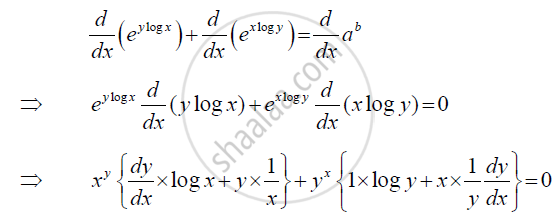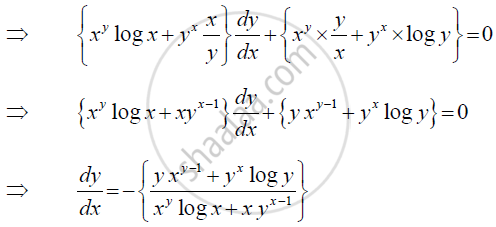Advertisements
Advertisements
प्रश्न
if `x^y + y^x = a^b`then Find `dy/dx`
उत्तर
Given that,
`x^y + y^x = a^b`
=> `e^(ylogx) + e^(xlogy) = a^b`
On differentiating both sides with respect to x, we get


APPEARS IN
संबंधित प्रश्न
Find dy/dx if x sin y + y sin x = 0.
Find `dy/dx` in the following:
2x + 3y = sin y
Find `dy/dx` in the following:
xy + y2 = tan x + y
Find `dy/dx` in the following.
x3 + x2y + xy2 + y3 = 81
Find `dy/dx` in the following:
sin2 y + cos xy = k
If for the function
\[\Phi \left( x \right) = \lambda x^2 + 7x - 4, \Phi'\left( 5 \right) = 97, \text { find } \lambda .\]
Examine the differentialibilty of the function f defined by
\[f\left( x \right) = \begin{cases}2x + 3 & \text { if }- 3 \leq x \leq - 2 \\ \begin{array}xx + 1 \\ x + 2\end{array} & \begin{array} i\text { if } - 2 \leq x < 0 \\\text { if } 0 \leq x \leq 1\end{array}\end{cases}\]
Find `(dy)/(dx) if y = cos^-1 (√x)`
Find `"dy"/"dx"` if x = at2, y = 2at.
Find `"dy"/"dx"` if x = a cot θ, y = b cosec θ
Find `"dy"/"dx"`, if : x = `sqrt(a^2 + m^2), y = log(a^2 + m^2)`
Find `"dy"/"dx"`, if : `x = cos^-1(4t^3 - 3t), y = tan^-1(sqrt(1 - t^2)/t)`.
If x = at2 and y = 2at, then show that `xy(d^2y)/(dx^2) + a` = 0.
Find the nth derivative of the following : `(1)/(3x - 5)`
Differentiate the following w.r.t. x : `sin[2tan^-1(sqrt((1 - x)/(1 + x)))]`
Differentiate the following w.r.t. x : `tan^-1[sqrt((sqrt(1 + x^2) + x)/(sqrt(1 + x^2) - x))]`
If log y = log (sin x) – x2, show that `(d^2y)/(dx^2) + 4x "dy"/"dx" + (4x^2 + 3)y` = 0.
Find `"dy"/"dx" if, sqrt"x" + sqrt"y" = sqrt"a"`
If log (x + y) = log (xy) + a then show that, `"dy"/"dx" = (- "y"^2)/"x"^2`.
Choose the correct alternative.
If ax2 + 2hxy + by2 = 0 then `"dy"/"dx" = ?`
Choose the correct alternative.
If x = `("e"^"t" + "e"^-"t")/2, "y" = ("e"^"t" - "e"^-"t")/2` then `"dy"/"dx"` = ?
`(dy)/(dx)` of `xy + y^2 = tan x + y` is
Differentiate w.r.t x (over no. 24 and 25) `e^x/sin x`
If y = y(x) is an implicit function of x such that loge(x + y) = 4xy, then `(d^2y)/(dx^2)` at x = 0 is equal to ______.
If log (x + y) = log (xy) + a then show that, `dy/dx = (−y^2)/x^ 2`
If log(x + y) = log(xy) + a then show that, `dy/dx = (−y^2)/x^2`
Find `dy/(dx) "if" , x = e^(3t), y = e^sqrtt`.
Find `dy/dx` if, `x = e^(3t), y = e^(sqrtt)`
If log(x + y) = log(xy) + a then show that, `dy/dx = (-y^2)/x^2`
